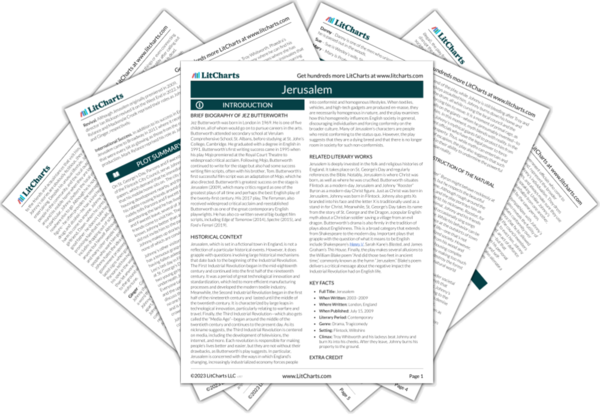In Jerusalem, the giant’s drum symbolizes the limitations of myth in the face of reality. In Act 2, Johnny tells his friends that he once met a giant who gifted him a large drum. According to Johnny, the giant told him to beat the drum if his back was ever up against the wall and giants would come running. In this light, the drum appears to symbolize great mythical power and significance. At the end of the play, though, when Johnny has lost everything and has to burn down his home, he beats the drum ferociously while cursing everyone who he thinks is responsible for his plight. Although the play fades to black before the audience can see what follows, one may presume that Johnny’s mythical giants never show up to rescue him. Therefore, while the drum carries significant symbolic weight in Johnny’s mind, it is not enough to save him from the cruelty of his reality. In this way, then, the drum’s symbolism shifts, and it ultimately represents the limitations of myth and storytelling in the face of reality. While Johnny’s tall tales might serve as necessary and entertaining escapism, ultimately the relief they bring Johnny and his friends is only temporary. When Johnny is up against more powerful forces of reality, like the government officials who serve him papers to remove him from the land he’s claimed as his own, his stories fail to give him the protection he needs to preserve his way of life.
The Giant’s Drum Quotes in Jerusalem
JOHNNY: He said, ‘This is for you. If you ever get in any bother, or you need a hand, just bang this drum and us, the giants, we’ll hear it, and we’ll come.’

Unlock explanations and citation info for this and every other Jerusalem quote.
Plus so much more...
Get LitCharts A+JOHNNY: Come, you drunken spirits. Come, you battalions. You fields of ghosts who walk these green plains still. Come, you giants!
Relentlessly he beats the drum. Faster. Faster. Staring out. He pounds on and on until the final blow rings out and…
Blackout
Curtain.
The End.












